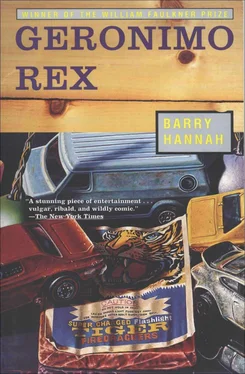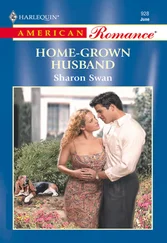He was whining now, like Fleece said. He might have his double-zero armory, but the guns were shaking useless in his hands. He was begging the villain please not to come again.
“I think I’ve made a sedate old racist out of him,” said Bobby Dove. “Nervous and absolutely immobile. I put age on him. I’ll bet he doesn’t reach for your sweetheart any more without thinking of bullets coming in the window. I bet she’s been dry for two months. The Jackson police, ‘until they break this case.’ Sheeit. He knows as well as we do that in Mississippi, all you have to do is be sure, when you strike, you strike by night, and you can do it free. They, or he, or it, shot Medgar in the back, that person isn’t ever going to see the wrath of the law.”
“Really,” I said, “you ought to realize how damn awful lucky you are even being alive, saying this. It was a miraculous fluke . I watched it.”
He smiled like a possum. He drew his hands back through his bursting Trotsky hair.
“I was so drunk, and it was so, so perilous . He saw me and shot at me, I could see a cloud break out of the end of his gun, nine or ten times. Then I pulled on him, the very first time I ever shot a weapon of any sort. I got him. I saw the puff on my gun, and I saw the bullet travel out of it and strike him.”
“You saw the bullet travel out of the gun?”
“Right to his knee. It was so certain. And all mine.”
It passed into autumn. We saw nothing in the newspapers. I’d been avoiding the house all summer, still a bit leery. I tried to do well in my studies. I’d get concerned about midnight and read my books until three or four, and leave the house at eight, feeling miserable, but passing the quizzes. I have a beard which grows exceeding slow but is thick when it finally gets out. When it was out, I thought the time was ripe to ride by and see the house again. I took Silas’s Pontiac. He wanted to go too.
There.were no policemen staked out around the place. The car tires crackled over the red and yellow leaves in the street. The wind was lukewarm. The house itself was surrounded by maples and oaks. It was a big stained Spanish house with a red tile roof and green wainscoting and a driveway of clay-colored rocks. Growing close to the house were yucca plants — green sharp Mexican-looking things. There were a number of Los Angeles villas like this in Jackson, but none of them quite so grand. It was furnished with a garage that also had a red tile roof and a steeple, altogether useless except for esthetics.
On the third trip by the house, around five o’clock, I saw Peter and Catherine getting out of the Buick in the garage. She had her books and he had his cane. He still wore the tall smashed cowboy hat. Catherine had her hair trimmed to pixie style. I hadn’t seen her for a month. I was driving the Pontiac. She dragged behind Peter slavishly, arms full, through with Heder man sever for another day. Her head hung to one side so that her throat was bared.
“The tires are on the curb, man! Get us off the curb!” said Silas.
“Did you see her?”
“I never thought she was such a cutey-pie.”
“She’s delicate.”
“Aw delicate, delicate. She reminds me of a TV dinner. Put a little aluminum foil around her. Can’t you see the old boy beating his cane on the floor in ecstasy.”
“I don’t need any help with my imagination.”
“Anyway, it was Whitfield Peter I was looking at. I’ve seen that old boy before somewhere,” said Silas.
“What the hell do you mean? At the musical, under his porch.”
“I didn’t see him good, though. I mean another time. He had on an overcoat like he was wearing just then.”
“At night? When? What was he doing?”
“I can’t tell you. Where was it? Come on, mind!”
When we got to Mother Rooney’s, supper was ready. The whole rear of the house glowed red and gold through the windows and you could hear merry-go-round music screeching away like an accordian run by a locomotive engine. The Mississippi state fair was in session right down the cliff in back of us. On the grounds nearest us were the cattle and swine exhibitions, with their dense stench. It was the same Royal American Shows fair that I’d seen back in Dream of Pines, and I felt right at home, though the others were cursing it. You could see the “Harlem in Havana” club, way over there to the right of the ferris wheel; could see the musicians playing on the balcony for the girls in their wraps on the stage, in the five-minute spot they did to invite you in to the real show, $1.50. Mother Rooney’s house sloped even more now, it seemed. You might sit down on those slick dark planks of the entrance hall and slide right through the house, out the back, and be hurled over the cliff into the fair like a tumbling angel; the sawdust and the hay of the animal barns would catch you. Then to hit, I thought, and roll briefly, bouncing up on the fly, being right in the middle of Dream of Pines Royal American Shows, 1957.
Mother Rooney was not at the table. I was the last to finish. The others had left. I took my plate to the kitchen and saw her. She was sitting in a chair next to the back window, which was open although the weather was very cool. Her hands were up to her ears and she looked distressed. I asked her what was wrong. Then she put her hands over her face.
“He’s dead. But last year when the fair came and now again, I hear his voice calling me. I don’t want to hear it but I have to.”
“Who?”
“Hoover Second, my son.”
“That was killed in the airplane crash?”
“I loved him so, but I never said I wanted any ghost calling me.”
She told me someone or something was calling to her, “Mother!” Over and over. She couldn’t stand to go in the back yard and see who it was, and she couldn’t stand not to hear the voice, either. It scared her, but she had to hear it. I gave her my arm and walked her to the ledge of the cliff where the kudzu began. Below us fifty yards was a truck with a ramp leading off it. There were a few cows in the truck. Some boys in blue corduroy FFA jackets were trying to drag the cows down the ramp. I didn’t know what she could be hearing. Then one of the boys hit a cow with a stick and yelled out, as I later explained to Mother Rooney, one of the graver profanities, denoting incest and including the word mother . She was disabused, but she didn’t seem overly relieved.
On the way back to the porch, she kept her eyes on my face. “Why would anyone find it necessary to use that word?” she asked me.
“It’s as old as the Greeks. It’s a cruel world, Mother.”
Her eyes were weak, but they shot wide and angry just then. “Don’t you tell me how cruel the world is, Mister Monroe.” I apologized. “Young men who learn a lot of knowledge should not be prissy little scholars.” Then she apologized. “I do thank you, dear. I thought I was losing my mind. Do, do thank you.”
I asked Fleece what he knew about Mother Rooney’s son. I felt wretched. Fleece had talked to her privately several times. He told me her son was a hero of almost suicidal bravery who piloted a B-25 bomber on deep flights into Germany. He’d come back home in 1945 with his legs full of shrapnel, but in Jackson he couldn’t stop. He bought a Piper Cub from the Civil Air Patrol, stole several boxes of toilet paper out of the basement of his old high school, St. Joseph’s, and flew over such things as the state capitol building, the governor’s mansion, and football games, cutting the engine and screaming something, as he cast out the toilet-paper rolls, which unwound and plummeted and scrawled in the air over these places. When the newspapers found out he was a famous veteran, they thought he was beautiful, with his sense of humor. He was Jackson’s high jolly aerobird. Then they found out he was not jolly, as Mother Rooney knew well, seeing him rush out to the airport every morning with only a half-cup of coffee in him for breakfast. He came down on some girls who were playing tennis over at Mississippi College, right at them, they said, and crashed against a practice board on the courts. Mother Rooney and her husband Hoover Rooney were called over to the college to see the black wreck.
Читать дальше












